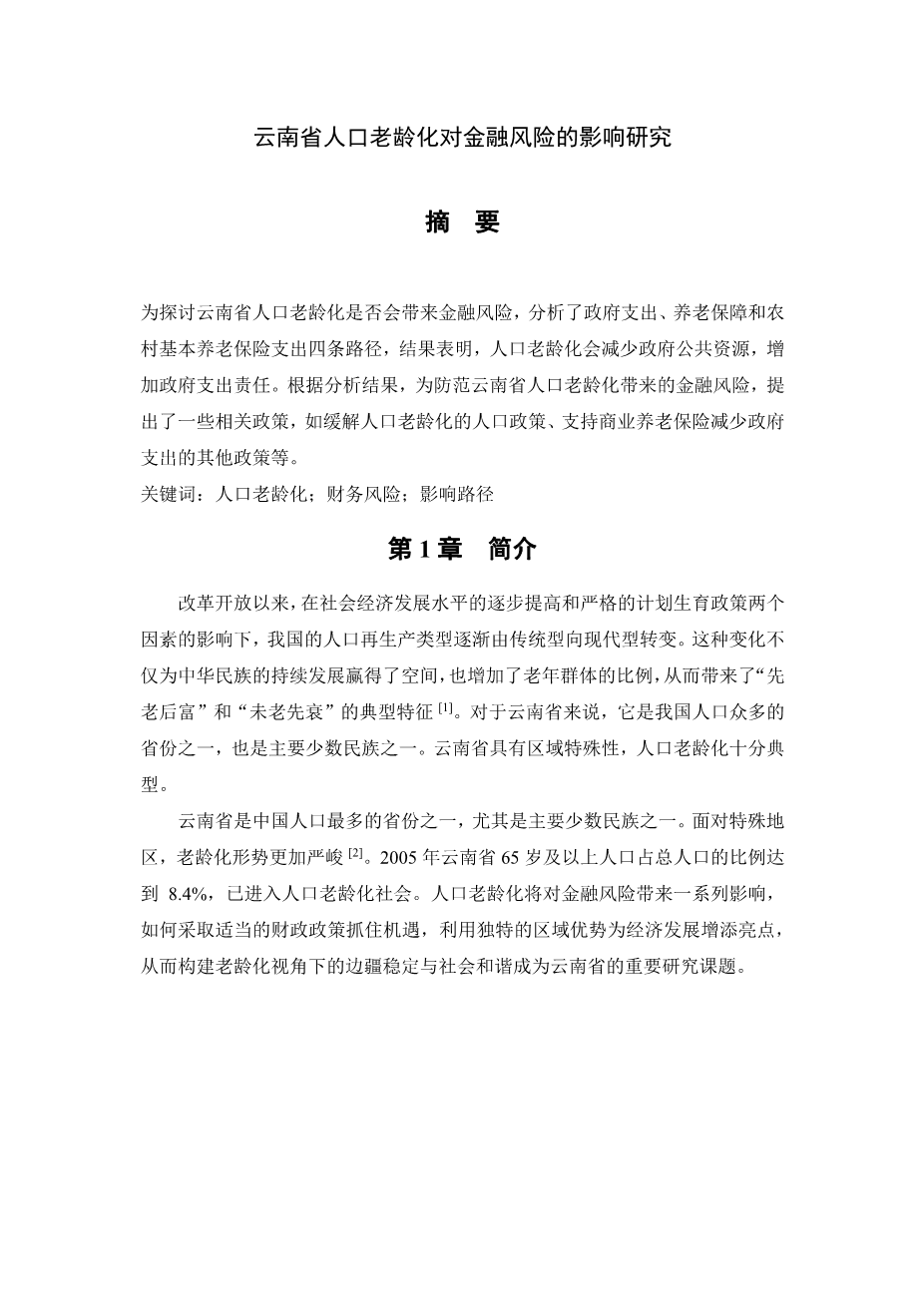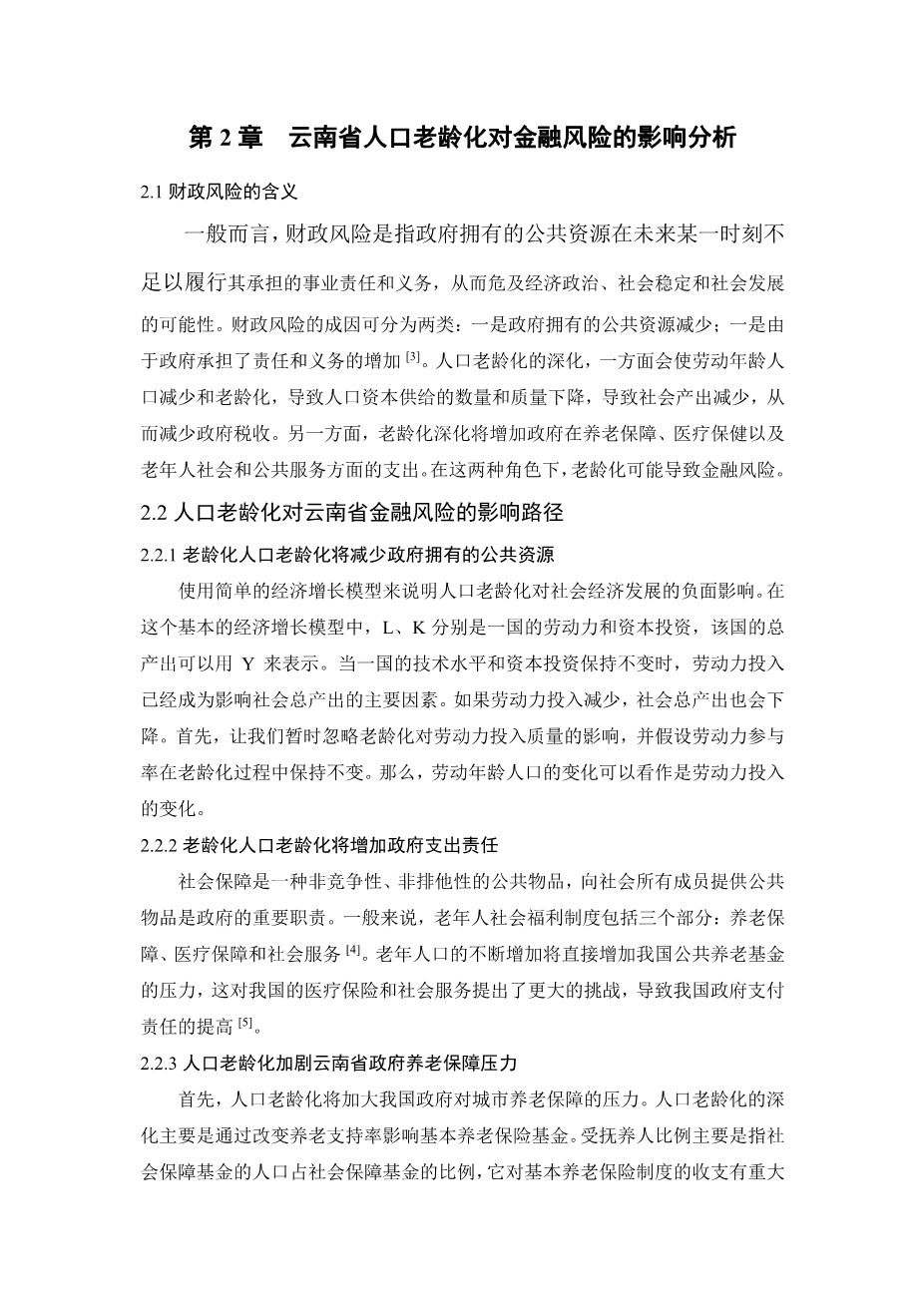Study on the Effects of Population Aging for Financial Risks in Yunnan Province
Abstract
To investigate whether the aging population in Yunnan Province will bring about financial risks, four paths were analyzed: government expenditure, the old-age security and the rural basic pension expenditure and the analysis shows that government public resources would be reduced and government spending responsibilities would be increased due to population aging. Based on the analysis results, to prevent the financial risks brought about by the aging population in Yunnan Province, some relevant policies were put forward, such as the policy of population to alleviate the aging of the population, support the commercial endowment insurance to reduce government expenditure other policies and so on.
Keywords: Aging Population; Financial Risk; Influence Path
1 Introduction
Since the reform and opening up, in the gradual improvement of the level of social and economic development and strict family planning policy - under the influence of two factors, Chinas population reproduction type gradually changed from traditional to modern. This change is not only for the continued development of the Chinese nation to win the space also increased the proportion of the elderly groups, thus bringing the ' old before getting rich ' and 'not prepared for the old' typical features[1]. For Yunnan Province, it is one of the big populations of our country and it is also one of the major ethnic minorities. Yunnan Province has a regional specificity and population aging is very typical.
Yunnan Province is one of the most populous provinces in China, especially one of the major ethnic minorities. In the face of special region, the aging situation is even more severe[2]. Yunnan Province in 2005, 65 years of age and older population accounted for the proportion of the total population reached 8.4%, has entered the aging population society. The aging of the population will bring about a series of effects on the financial risk, how to take appropriate fiscal policy to seize the opportunity and use the unique regional advantages for the economic development to add bright spots, so as to build an aging perspective of the frontier stability and social harmony become Yunnan Province of important research topics.
2 Analysis of the Impact of Population Aging on Financial Risks in Yunnan Province
2.1 Meaning of financial risk
In general, fiscal risk refers to the possibility that government-owned public resources at some point in the future are not sufficient to meet the responsibilities and obligations of the undertakings they bear so that economic and political, social stability and social development are compromised. The causes of financial risks may fall into two categories: One is the reduction of public resources owned by the government; one is due to the government to bear the burden of responsibility and increased obligations[3]. The deepening of the population aging, on the one hand, will make the labor age population reduce and aging, causing the quantity and quality of the population capital supply to decline and lead to the reduction of social output and thus reduce the government tax revenue. On the other hand, deepening aging will increase government spending on old-age security, health care and social and public services for the elderly. Under these two roles, aging can lead to financial risks.
2.2 Path of Impact of Population Aging on Financial Risks in Yunnan Province
2.2.1 Aging population aging will reduce government-owned public resources
A simple economic growth model to illustrate the negative impact of population aging on socio-economic development was used. In this basic economic growth model, L, K, respectively, a countrys labor and capital investment, the countrys total output can be expressed as Y. When a countrys technical level and capital investment remain unchanged, labor input has become a major factor affecting the total social output. If the amount of labor input is reduced, the total social output will also decline. First, Letrsquo;s temporarily ignore the impact of aging on the quality of labor inputs and assume that labor participation rates remain constant in the aging process. Then, changes in the working age population can be seen as changes in labor input.
2.2.2 Aging population aging will increase government spending responsibilities
Social security is a non-competitive and non-exclusive public goods, and the provision of public goods to all members of society is an important responsibility of the government. In general, the social welfare system for the elderly includes three parts: old-age security, medical security and social services[4]. The increasing number of elderly population will directly increase the pressure of public pension funds in our country, which poses a greater challenge to our countrys medical insurance and social service resulting in the improvement of our governments payment responsibility [5].
2.2.3 Aging of the population aggravates the pressure of the old-age security of the Yunnan provincial government
First, the aging of the population will increase the pressure of our government on urban pension security. Deepening the aging of the population is mainly through the change in the support ratio of old-age affect the basic pension insurance fund. The ratio of dependents mainly refers to the ratio of the population of the social security fund to the social security fund, which has a significant impact on the income and expenditure of the basic old-age insurance system. When the ratio is low, it indicates that the system contributes more than the recipient to form a situation where the income is greater than the expenditure. When the ratio is high, it means that the recipient is relatively increas
剩余内容已隐藏,支付完成后下载完整资料


英语译文共 5 页,剩余内容已隐藏,支付完成后下载完整资料
资料编号:[589581],资料为PDF文档或Word文档,PDF文档可免费转换为Word


